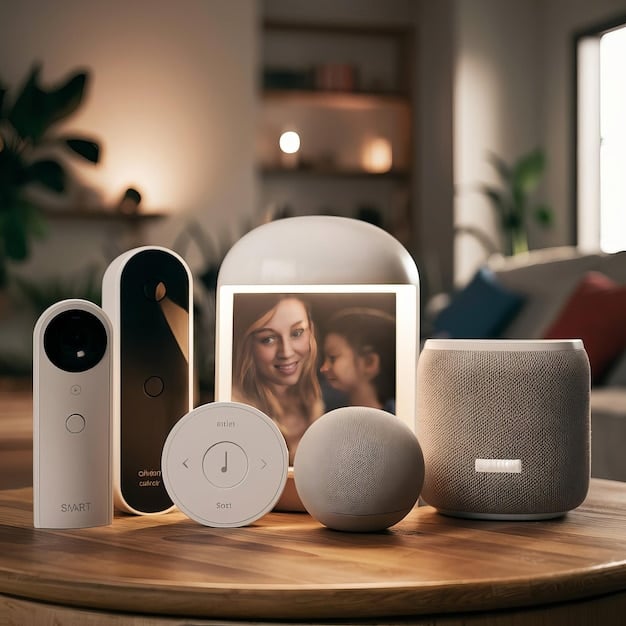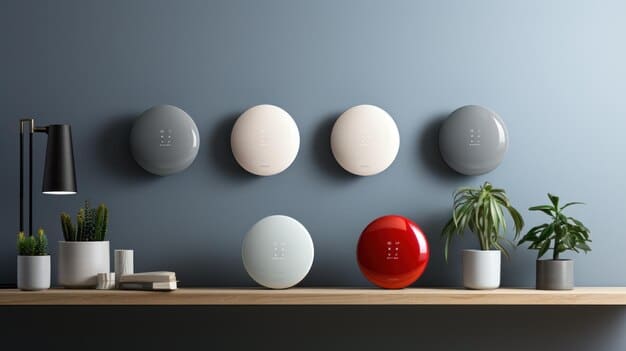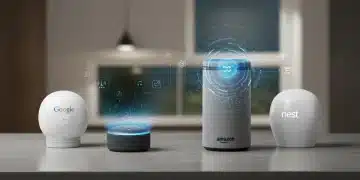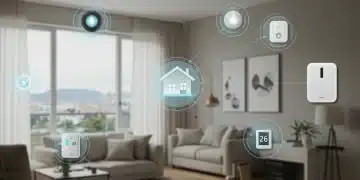Smart Home Hubs Compared: Choosing the Right Ecosystem in 2025

Choosing the right smart home hub involves comparing different ecosystems like Amazon Alexa, Google Assistant, and Apple HomeKit to ensure compatibility, security, and user-friendliness for your connected devices in 2025.
Navigating the world of smart home technology can be overwhelming, especially when it comes to choosing the right central hub. This guide, Smart Home Hubs Compared: Choosing the Right Ecosystem for Your Connected Devices in 2025, will help you make the best decision for your connected devices.
Understanding the Smart Home Landscape in 2025
The smart home landscape in 2025 is characterized by increased integration, enhanced security, and more intuitive user experiences. Understanding these trends is crucial when investing in a smart home hub.
As technology advances, smart home devices are becoming more sophisticated and interconnected, requiring a central hub to manage them effectively.
Key Trends Shaping Smart Homes
Several key trends are expected to shape the smart home landscape in the coming years. These include enhanced AI integration, improved interoperability, and greater emphasis on data privacy.
- Enhanced AI Integration: Expect AI to play a bigger role in automating tasks and personalizing user experiences.
- Improved Interoperability: More devices will support standard protocols, making it easier to connect different brands and systems.
- Greater Emphasis on Data Privacy: Consumers will demand more control over their data, pushing manufacturers to prioritize security and privacy features.
These trends highlight the importance of choosing a smart home hub that can adapt to future advancements and protect your personal information.
In conclusion, the smart home landscape in 2025 is geared towards more seamless integration, enhanced security, and user-centric design. Keeping these trends in mind will enable smarter choices when setting up your connected home.

Amazon Alexa: The Versatile Voice Assistant
Amazon Alexa remains a dominant player in the smart home market, offering a wide range of compatible devices and skills. Its versatility makes it a popular choice for many users.
Alexa’s strength lies in its extensive ecosystem and its ability to integrate with numerous third-party services.
Pros and Cons of Alexa
Like any smart home system, Alexa has its advantages and disadvantages. Understanding these can help you decide if it’s the right choice for your needs.
- Pros: Wide range of compatible devices, extensive skill library, and seamless integration with Amazon services.
- Cons: Privacy concerns, occasional inaccuracies in voice recognition, and reliance on Amazon’s ecosystem.
Consider the pros and cons carefully when evaluating Alexa for your smart home setup.
In conclusion, Amazon Alexa offers a versatile and expansive platform for managing your smart home. However, it’s essential to weigh the benefits against potential privacy concerns to make an informed decision.
Google Assistant: The AI-Powered Hub
Google Assistant stands out with its advanced AI capabilities and seamless integration with Google services. It’s a smart choice for those deeply embedded in the Google ecosystem.
Its strength lies in its ability to understand natural language and provide personalized, context-aware responses.
Deep Dive into Google Assistant’s Features
Google Assistant offers a range of features that enhance the smart home experience. These include proactive notifications, personalized routines, and robust device control.
Additionally, Google Assistant’s integration with Nest devices provides advanced home security and automation options, making it a compelling choice for a comprehensive smart home setup.
Ultimately, Google Assistant’s AI-powered features and integration with Google services make it a strong contender in the smart home hub market.
Apple HomeKit: The Privacy-Focused Ecosystem
Apple HomeKit is known for its emphasis on privacy and security, providing a secure environment for your smart home devices. It’s a natural fit for users already invested in the Apple ecosystem.
HomeKit’s strength lies in its focus on data protection and seamless integration with Apple devices.
Security and Privacy Features of HomeKit
HomeKit offers end-to-end encryption and requires devices to be certified for security, ensuring a safe and private smart home experience.
Apple’s commitment to privacy is a major selling point for HomeKit, making it an attractive option for those concerned about data security.
In conclusion, Apple HomeKit is an excellent choice for users who prioritize privacy and security in their smart home setup. Its seamless integration with Apple devices and robust security features make it a standout option.
Hubitat Elevation: The Local Control Option
Hubitat Elevation offers local control of your smart home devices, providing a more reliable and private alternative to cloud-based systems. It’s a great option for tech enthusiasts who want more control.
Hubitat’s strength lies in its ability to operate independently of the cloud, ensuring that your smart home continues to function even without an internet connection.
Benefits of Local Control
Local control offers several advantages, including improved reliability, enhanced privacy, and reduced latency. It also gives you more control over your data.
- Improved Reliability: Devices continue to function even without an internet connection.
- Enhanced Privacy: Data remains local, reducing the risk of security breaches.
- Reduced Latency: Faster response times due to direct device communication.
Consider the benefits of local control when choosing a smart home hub, especially if you value reliability and privacy.

In summary, Hubitat Elevation provides a compelling solution for users seeking local control and enhanced privacy in their smart home setup. Its ability to operate independently of the cloud makes it a reliable and secure option.
Samsung SmartThings: The Wide Compatibility Choice
Samsung SmartThings offers broad compatibility with a wide range of devices and protocols, making it a versatile choice for building a diverse smart home ecosystem. Its open platform allows for extensive customization.
SmartThings’ power is in its capacity to work with a variety of protocols and devices, ensuring that you can integrate nearly any smart device into your setup.
Exploring SmartThings’ Ecosystem
SmartThings supports Zigbee, Z-Wave, and Wi-Fi devices, allowing you to connect a diverse range of products. It also offers a user-friendly interface for creating custom automation routines.
With SmartThings, you can create complex automation scenarios, such as automatically adjusting the thermostat when you leave home or turning on the lights when motion is detected.
In conclusion, Samsung SmartThings is an excellent option for users who want a versatile and customizable smart home hub with broad device compatibility. Its support for multiple protocols and user-friendly interface make it a popular choice.
| Key Feature | Brief Description |
|---|---|
| 💡Amazon Alexa | Versatile voice assistant with a wide range of compatible devices. |
| 🤖Google Assistant | AI-powered hub deeply integrated with Google services, offering personalized experiences. |
| 🔒Apple HomeKit | Privacy-focused ecosystem with end-to-end encryption and secure device certification. |
| 🏠Hubitat Elevation | Local control option, ensuring reliable operation and enhanced privacy. |
FAQ
▼
A smart home hub is a central device that connects and controls various smart devices in your home, allowing them to communicate with each other and be managed remotely.
▼
A smart home hub simplifies the management of multiple smart devices, enabling automation, voice control, and remote access, enhancing convenience and efficiency.
▼
Apple HomeKit is generally considered the best for privacy due to its end-to-end encryption and strict device certification requirements, ensuring data protection.
▼
Yes, you can use multiple smart home hubs to integrate different ecosystems, but it may require more technical knowledge and could lead to compatibility issues.
▼
Consider compatibility with existing devices, privacy features, ease of use, and future scalability when selecting a smart home hub that fits your needs and preferences.
Conclusion
Choosing the right smart home hub for 2025 involves considering factors like compatibility, security, and user experience. By understanding the strengths and weaknesses of each ecosystem, you can create a connected home that meets your needs and enhances your lifestyle.





